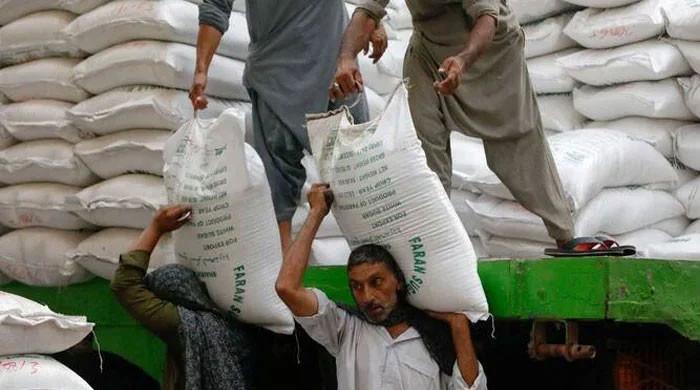 |
| The undated image shows laborer carrying sacks of refined sugar. —APP/File |
SECP Discloses Sugar Mills' Shareholder Names Amid Price Surge Inquiry
SECP Discloses Sugar Mills
Shareholder Details to NA Subcommittee Amid Price Hike Probe
The SECP submitted sugar mill
ownership records—including political heavyweights—to the National Assembly
subcommittee investigating soaring sugar prices and possible price
manipulation.
The undated image shows laborer carrying sacks of
refined sugar. —APP/FileISLAMABAD: The Securities and Exchange Commission of
Pakistan has presented comprehensive details of sugar mills and their
shareholders to a subcommittee of the National Assembly’s Commerce Committee,...
Amid rising concerns over soaring sugar prices in Pakistan,
the Securities and Exchange Commission of Pakistan (SECP) delivered a
high-profile disclosure: detailed ownership records of sugar mills, revealing
prominent political and business affiliations. The data was shared with the
National Assembly subcommittee on commerce as part of an urgent probe into
price manipulation.
The Deep Roots of Price Concerns
Sugar prices recently skyrocketed across the country,
prompting outrage among consumers and lawmakers. The Federal Board of Revenue
previously reported a staggering Rs300 billion windfall in profits for
mill owners. Lawmakers suspect cartel-like behavior, with a handful of powerful
players possibly manipulating supply and pricing for gain.
To shed light on ownership structures and potential
conflicts of interest, the subcommittee demanded data from 81 sugar
companies. In response, the SECP presented a comprehensive breakdown of
shareholders, exposing many heavyweight names in Pakistan’s political and
business landscape.
Names That Stand Out
The disclosures include:
-
Al-Arabia Sugar Mills: Owned in part by PML-N’s Hamza Shahbaz Sharif and Nusrat Shahbaz.
-
Ramzan Sugar Mills: Also lists Hamza Shahbaz, Salman Hamza Sharif, and Nusrat Shahbaz.
-
Punjab Sugar Mills: Counts PML-Q leaders Chaudhry Shujaat Hussain and Salik Hussain among stakeholders.
-
RYK Mills: Names PTI’s Moonis Elahi and Makhdoom Omar Shehryar as shareholders.
-
Tando Allahyar Sugar Mills: Fully owned by businessman Khawaja Abdul Ghani Majeed.
-
Ashraf Sugar Mills: Includes former PCB chairman Zaka Ashraf.
-
Rahim Yar Khan Sugar Industry: Shares held by media magnate Mian Amer Mehmood.
-
Additional mills with prominent owners include Madina, Fatima, Ittehad, Baloch, Chaudhry, and Cheema Sugar Mills, listing members of Ayers, Mukhtars, MazarIs, Sharifs, Nakai, and others among stakeholders. The News International
Why This Data Matters
Pakistanis are demanding answers—and fast—about why
households are paying exorbitant rates for basic sugar. With major players
linked to political powerhouses, the risk of conflict between public duty and
private profit becomes heightened.
Access to this shareholder data arms lawmakers and consumers
with transparency, allowing them to trace decision-making levers to individuals
within the sugar supply chain. In essence, it's a step toward dismantling
opaque price-setting practices.
Lawmakers Speak Out
The National Assembly panel has repeatedly emphasized that
the local sugar crisis isn’t about supply shortages but about deliberate
pricing manipulation—and the shareholder report confirms who’s at the controls.
Atif Khan, chairing another parliamentary investigation,
pushed to single out mill owners with more than 20% equity. He expressed
outrage over how millers and dealers dominated stock flows, calling for a full
overhaul of the sugar sector—including deregulation and breaking up cartels. Business RecorderProfit by Pakistan Today
What Comes Next?
With ownership documents now public, the subcommittee is
well-positioned to scrutinize business links, board practices, pricing
decisions, and stock retention strategies. Lawmakers may pursue outcomes such
as:
- Enforcing
penalties for price gouging.
- Mandating
equitable supply distribution.
- Inviting
media scrutiny into ownership and influence.
- Proposing
structural reforms to open the sugar market and deter monopolistic
control.
Meanwhile, public trust hinges on swift, fair, and transparent action.
